Integral University, Lucknow, established with the vision of promoting holistic education and societal development, has consistently strived to contribute to sustainable growth through teaching, research, and community engagement. As a multidisciplinary institution, the University not only provides quality education but also extends its efforts beyond academics to address key social challenges such as hunger and food insecurity.
SDG 2 (Zero Hunger) highlights the global commitment to ending hunger, achieving food security, improving nutrition, and promoting sustainable agriculture. This goal is particularly significant for India, where challenges such as rising population, climate variability, and resource limitations impact food availability and nutrition. In this context, universities serve as vital platforms for research, innovation, and community-driven action to tackle these pressing issues.
During the year 2023-24, Integral University strengthened its initiatives toward sustainability and hunger eradication. The University undertook research activities focused on agriculture, food security, and nutrition, contributing valuable insights to both national and global discussions on these themes. Efforts were also made to promote healthy and affordable food options within the campus and to monitor food waste generation as part of the University’s sustainability drive.
Additionally, Integral University engaged with local communities and farmers through training programs and awareness campaigns on sustainable agricultural practices and food management. These initiatives not only supported local livelihoods but also helped build awareness on responsible consumption and production.
Through these academic, institutional, and outreach efforts, Integral University made significant strides in aligning itself with Sustainable Development Goal 2 (Zero Hunger), thereby demonstrating its commitment to creating a hunger-free and sustainable society.
Research on Hunger:
The Faculty of Integral Institute of Agricultural Science and Technology (IIAST), Integral University, actively contributed to SDG 2 (Zero Hunger) during the academic year 2023-24 through its research, teaching, and extension activities. The major focus of its research was on sustainable farming practices, crop residue management, soil health improvement, and food security interventions, directly benefiting farmers and rural communities.
Throughout the session, the University’s faculty members published their research outcomes in reputed Scopus-indexed journals, reflecting the quality and impact of their work on agricultural sustainability and food systems. Collaborative projects were also undertaken with external organizations to address challenges related to nutrition security, resource management, and climate resilience.
Integral University continued to strengthen its position as a recognized centre for agricultural excellence. Its agriculture-related programmes, acknowledged by ICAR, emphasize both academic rigor and field-level application. In addition, the University extended its support to rural communities through training programs, soil testing services, and technology transfer activities, thereby bridging the gap between scientific knowledge and on-ground application.
Through these consistent efforts, Integral University positioned itself as a prominent contributor in advancing sustainable agriculture, enhancing food security, and supporting the broader mission of achieving Zero Hunger at both the national and global levels.
Access to Food Security Knowledge
During this year, Integral University undertook several initiatives to enhance access to food security knowledge and promote sustainable agricultural practices among local farmers and food producers. Through its Faculty of Agricultural Sciences, the University organized workshops, awareness programmes, and training sessions aimed at building the capacities of farming communities.
These programmes covered a wide range of relevant topics, including crop residue management, organic farming, soil health enhancement, integrated nutrient management, and climate-resilient agriculture. The focus remained on equipping farmers with practical, field-oriented solutions that improve productivity while conserving natural resources.
The University also supported technology dissemination and innovation through demonstration plots, exposure visits, and access to modern agricultural tools and machinery. In addition, soil and water testing services were made available to farmers to promote scientific land management and informed decision-making.
By integrating academic expertise with field-level engagement, Integral University successfully contributed to building a more knowledge-driven, sustainable, and food-secure rural ecosystem.
IPR on SDG 2:
The patents filed and granted reflect the university’s strong emphasis on sustainable agriculture and food security. Notable among these is the Insect Trapping Device for Agricultural Field, which plays a key role in pest management and protecting crop yields. The IoT-based Automatic Biological Vermi Compost Marker promotes eco-friendly soil fertility enhancement through precision composting, while the Solar Powered Hydroponics System demonstrates innovation in resource-efficient cultivation methods. Additionally, process-oriented patents such as the Pedal Operated Dehuller for Black Soybean and the Integrated Potato Peeling and Slicing Machine highlight efforts toward reducing post-harvest losses and improving food processing. Collectively, this year patents strengthen the link between innovation and sustainable agricultural practices in alignment with SDG 2.
Campus Food Waste: Campus Food Waste Tracking:
The University established a system to measure the amount of food waste generated from food served in the campus hostels and dining halls. The total monthly food consumption in hostels was approximately 12 quintals, of which nearly 20 percent, or around 2.4 quintals, was recorded as food waste. The primary reasons for this waste were late arrival of students, outside dining, and leftover cooked food. However, no food waste was discarded irresponsibly. All waste food was utilized effectively by sending it to fishponds, horticulture farms, and livestock units within the University. This circular use of food waste not only reduced environmental impact but also supported agricultural and animal husbandry activities on campus.
Indicator: Campus Food Waste
The University calculated food waste per person by dividing the total food discarded by the total number of individuals served, which included approximately 2,000 students and 160 staff members. To reduce wastage, self-service systems were implemented, allowing smaller, need-based portions. Regular feedback from students on meal menus helped prevent the preparation of unpopular dishes that often led to leftovers. Additionally, awareness activities encouraged responsible consumption and reduced unnecessary waste generation. Through these measures, the University was able to strengthen its monitoring and control over food waste and promote a culture of sustainability.
Student Hunger: Student Food Insecurity and Hunger
The University maintained a dedicated programme to address student food insecurity. All hostels provided nutritious and hygienic meals at affordable prices, ensuring that every student received adequate nutrition. The mess operated on a non-profit basis with a monthly fee of approximately 40 US dollars, which covered three balanced meals daily. Menus were planned scientifically based on protein and calorie requirements, ensuring nutritional adequacies for all students, including international and MBBS students who were provided separate meal plans suited to their dietary preferences.
2.3.2 Students Hunger Interventions
To prevent and alleviate hunger among students, the University ensured continuous access to affordable and healthy food within the campus. Breakfast and meals were made available for all students at reasonable rates, while additional measures were taken to support lower-income groups. For instance, guards, sweepers, and other support staff could avail breakfast at a nominal rate of less than 5 US dollars per month. Such initiatives reflected the University’s inclusive approach to eradicating hunger within its community.
2.3.3 Sustainable Food Choices on Campus
The University actively promoted sustainable food choices by providing both vegetarian and non-vegetarian options on campus. Lunches were entirely vegetarian, while dinners included both vegetarian and 30 percent non-vegetarian dishes. Vegetables and other raw materials were primarily sourced from local mandis, nearby farmers’ fields, and University farms, thereby supporting local agriculture and reducing the carbon footprint associated with food transportation. The emphasis on vegetarian meals and locally sourced ingredients aligned with the principles of sustainability,environmental consciousness, and community development.
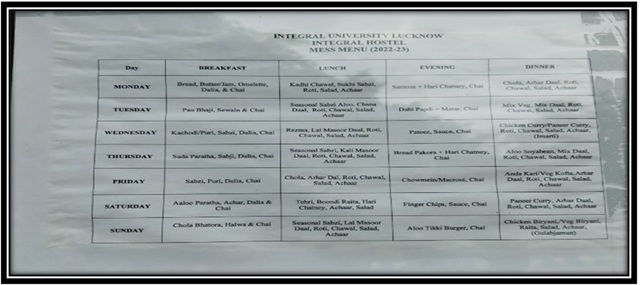
Mess Menu Chart Displayed
Healthy and Affordable Food Choices
Healthy and affordable food remained a central focus of the University’s meal programme. Menus were carefully prepared under the supervision of nutrition experts, ensuring that the food met both health and taste expectations. The University ensured that the price of meals remained affordable for all categories of students, without compromising nutritional value or hygiene standards. Employees working in the hostel mess were allowed to eat free of cost, reflecting the University’s welfare-oriented and equitable approach to campus management.
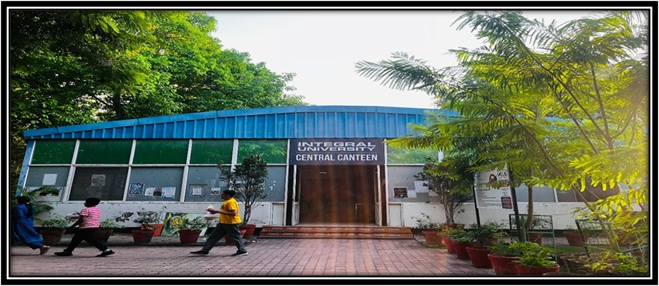
Central Canteen with a hall with 100 students sitting capacity
Staff Hunger Interventions
The University extended its food support and hunger interventions to staff members as well. Affordable and nutritious meals were made available to all employees, and support staff such as guards and cleaners received meals at highly subsidized rates. These initiatives ensured that no member of the University community suffered from food insecurity. Through these actions, the institution demonstrated a strong commitment to the well-being of both its students and staff, while fostering an inclusive and compassionate campus environment.
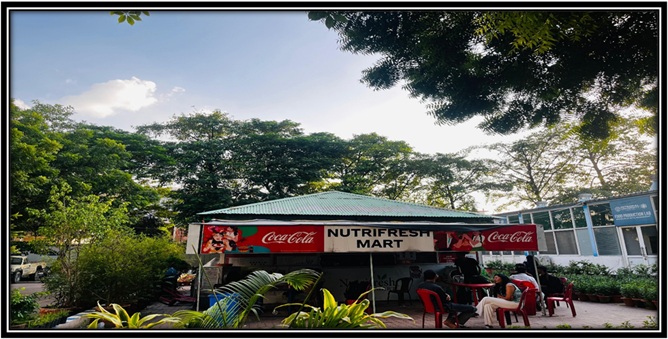
Nutrifresh Mart Offering Fruit Juices and Healthy Options
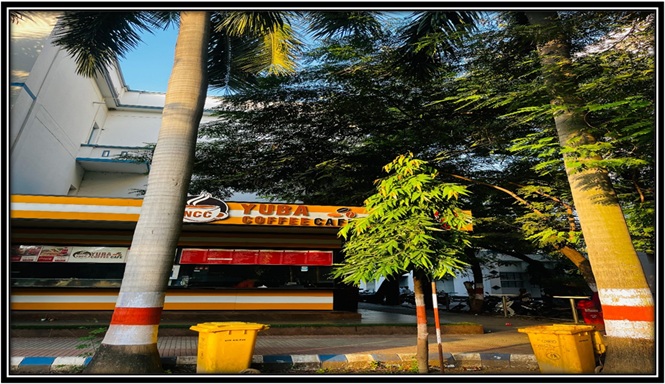
Yuba Coffee Cafe for Quick Breaks and Student Engagement
For the year 2023-24, the University successfully demonstrated a holistic model of food sustainability and hunger prevention. Through efficient food waste tracking, responsible recycling, affordable and nutritious meal programmes, and inclusive welfare measures, the institution upheld the core principles of SDG 2: Zero Hunger. The integration of sustainability with social responsibility ensured that food resources were utilized effectively, benefiting both the University community and the environment.
Proportion of Graduates in Agriculture Including Sustainability Aspects
Graduating over 250 students in agriculture with a strong emphasis on sustainability demonstrates the university’s commitment to food security, environmental stewardship, and ecological balance. This achievement highlights the institution’s role in preparing future leaders equipped with the knowledge and skills necessary to promote sustainable agricultural practices.
National Hunger :Access to Food Security Knowledge
The University initiated programmes to provide knowledge and skills on food security and sustainable agriculture to local farmers and producers.
Conducted basic awareness sessions on soil testing, composting, and water conservation.
Distributed leaflets and training manuals on nutrient management and seed treatment.
Events for Local Farmers and Food Producers
The University organized several extension meetings and demonstration programmes for farmers:
- Conducted on-campus training events and field demonstrations in different areas.
- Around 1000 farmers participated in total.
- Some workshops were organized in collaboration with Krishi Vigyan Kendras (KVKs).
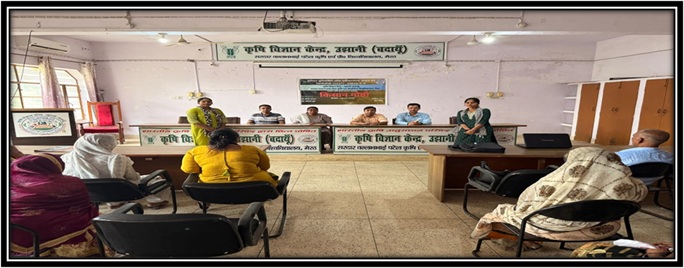
Kisan Gosthi in Collaboration with KVK Ujhani

RAWE Programme in Collaboration with KVK Ujhani
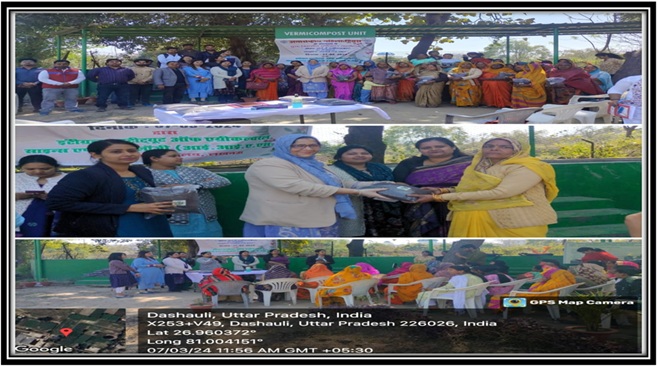
Empowering Women Farmers through Organic Farming Training
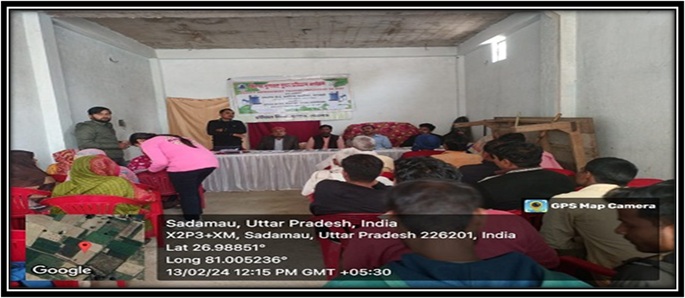
Training Program on Quality Improvement in Mint In Collaboration with Spices Board
(Ministry of Commerce and Industries, GoI) Regional Office, Barabanki
University Access to Local Farmers and Food Producers
The university conducts weekly extension activities every Saturday, led by faculty and students, to engage with local farmers and food producers. These sessions provide a platform for sharing knowledge, promoting best agricultural practices, and raising awareness on sustainable farming. Each session reaches over 1,000 farmers, fostering direct interaction, problem-solving, and capacity building to improve productivity and food security.
Farmers now have access to the university’s Soil Testing Laboratory, Mushroom Unit, Horticultural Farms, Nursery, and Fishery Ponds.
Training and technology demonstrations are conducted using demonstration plots and university-owned agricultural machinery.
Sustainable Food Purchases
The University’s mess and canteen system sourced some food products locally, mainly vegetables and milk.
- Approximately 55% of total food items were locally procured.
- No formal sustainability policy existed yet.
- Vendors were chosen primarily based on cost and availability.